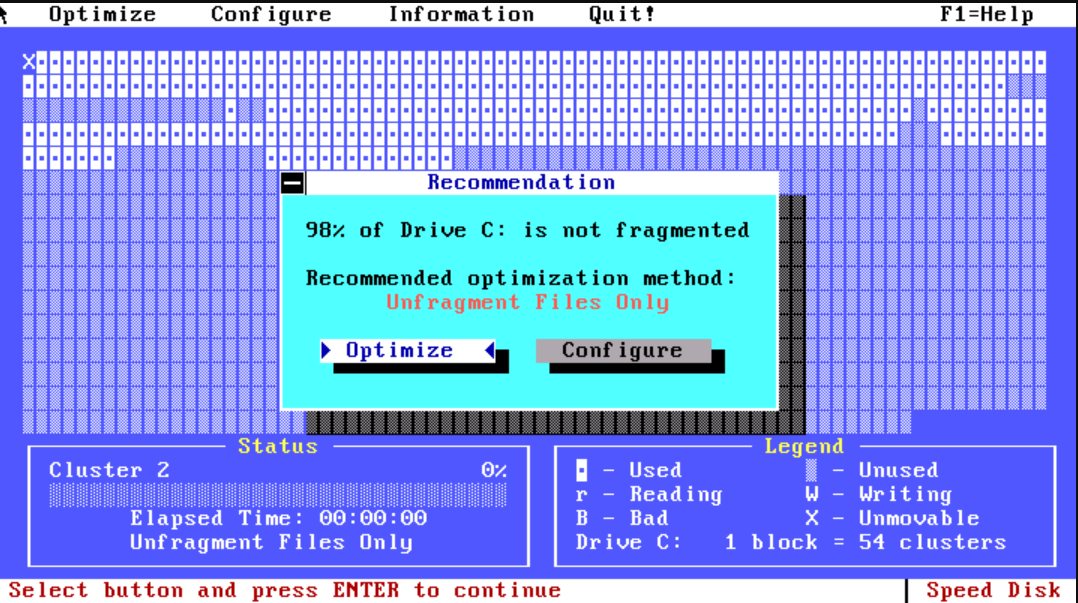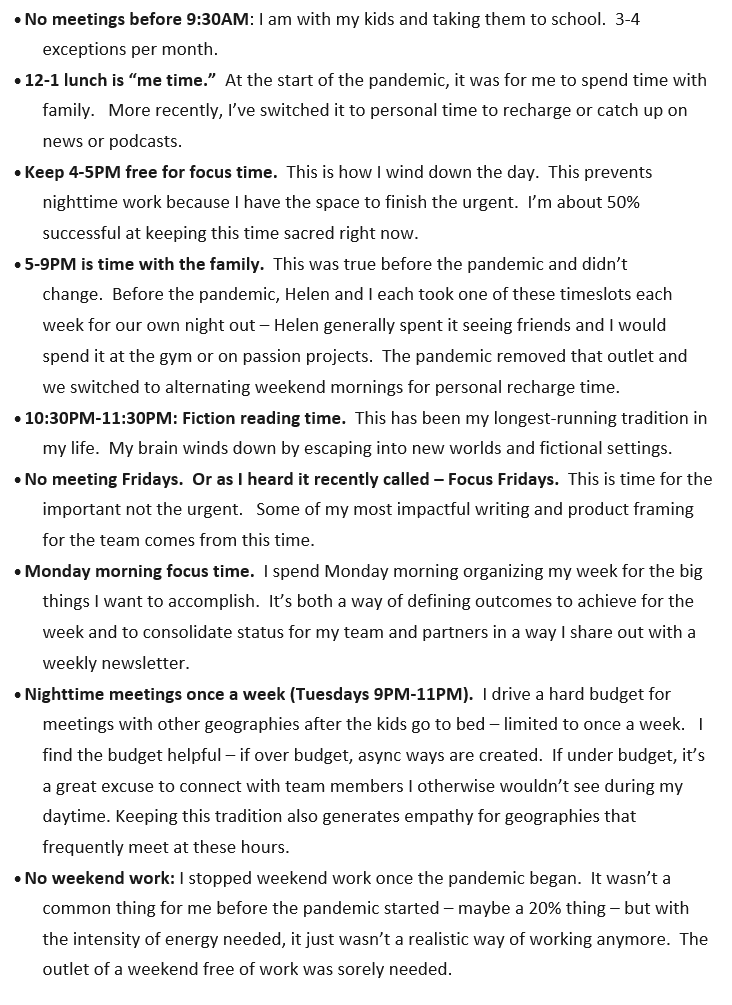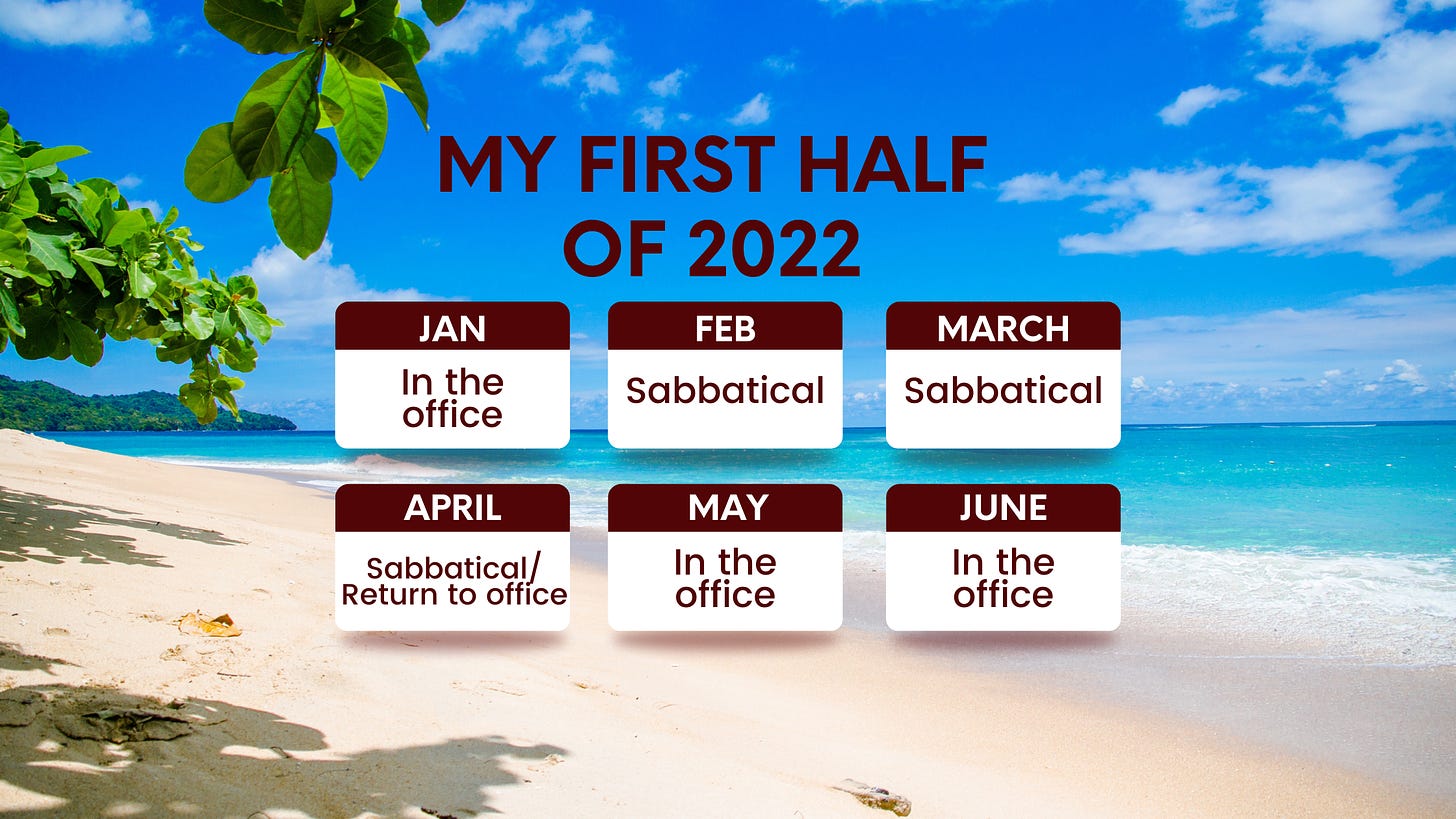Back when I was studying computer science - before the invention of solid-state drives - hard drives looked like this:
They had moving pieces! And this descent into the physical world meant there were tradeoffs - in this case between write speeds and read speeds. To maximize write speed, operating systems break data writes into smaller chunks based upon the size and proximity of free space and whatever algorithm is optimizing the movement of the mechanical arm. But that will fragment the data and make reading it back later slower.
To compensate, Microsoft and other operating system vendors developed a tool that many of us who grew up with computers in the 90’s look back fondly on: defrag.exe.

This tool took blocks of data that had been written randomly all over the disk and defragmented them into contiguous blocks for faster read access. Running defrag.exe was a standard rite of renewal for a sluggish PC.
I love how computers in those days needed maintenance. Today’s auto-updating and auto-healing environments take the lessons of renewal - the notion of a pause to reflect and recover - out of the equation.
Indeed, I think today’s work environment - likewise full of constant motion and turnover to the next thing - reflects the current state of always-on technology. The pandemic has made this worse, removing other forms of renewal/reflection (commutes, snow days, work trips, office celebrations).
We need more defrag.exe in our work lives.
Making Your Company Work For You
On Dux Raymond Sy’s Shift Happens podcast, Helen and I talked about a philosophy we heard recently: Make your company work for you. The pace of our jobs needs active management; there’s a difference between what’s healthy and what’s the default. I’ve discussed this when I talk about how I spend my time, figuring out the gifts I want to give others, and especially in managing through the boredom and burnout boundaries of a pandemic, where I talked about some limiters I use today:
This notion of taking control of your work life is powerful. Not only is it critical to health, but it’s how you find the time to be strategic about your career, invest in your own growth, and prepare for the next stage of your job. It enables you to work with intensity when it’s required. Indeed, the notion of taking control and not being chewed up by the system is where the name of this newsletter comes from.
My News: Executing defrag.exe -c
Time to announce a bit of news: I’m running defrag.exe on my main disk in 2022. In particular, I’m taking advantage of an awesome opportunity that my company provides of taking a 2.5-month sabbatical. It’s awarded to employees after a certain number of years of continuous service (I’m at 16 and counting) and when you reach a certain level of senority.
I’m so grateful for this privilege and humbled by the opportunity it affords - an example of making my company work for me and an ultimate recharge moment that prepares me for that next stage of nonlinear progress once I return.
So What Are you Doing on Your Sabbatical?
Last April, I talked about How I Approached a Recharge Week. At that time, I was approaching burnout and really needed the time. This sabbatical feels different than that; less defense, more offense.
I’ve talked to over a dozen people who have taken their own extended time off. Many do a long trip with the family. Some have used it to move to new parts of the world. Others just use it to get stuff done. All of them described the transformative experience of stepping back from the day-to-day. The common thread seems to be the mental headspace achieved by not being part of the daily grind.
My journey is influenced by COVID (no international travel) and my family situation (kids are still young and will be in school during the time) and my partnership with Helen (she’s in the middle of a very exciting inflection point in her career and will be working intensely). How then to make use of the freed-up time while maintaining my responsibilities to my family and my community?
The biggest leap of faith for me is to frame my sabbatical as about investing in myself. There is a cultural taboo about saying you are doing something for yourself instead of always being the hero to all those you have responsibilities towards - kids, Helen, boss, team, customers. Yet I came to the conclusion that is exactly the leap I’m making, even if I feel vulnerable saying it. I hope the investment makes me a better father, husband, boss, and product leader.
In particular, I’ve centered around four gifts I hope to give myself during these next couple of months. All of them are designed to capture the time away from the flow of daily work and I hope all of them bootstrap enduring habits well beyond the time off.
Here are my four gifts to myself:
💪 Be Healthy
The gift I’m giving myself: I turn 40 this year so part of this is vanity - but I desire to be in the best shape of my life as I hit this milestone. I’d also love to start down the journey of mindfulness - just the ability to more quickly wind down at night would be transformative for me, but I’m eager to see how far I can get.
Potential menu of things to try:
Train for a half marathon. 🏃♂️ Running has always been my default workout jam - having the time to extend that passion is exciting to me. I’m on the hunt for any great races that are in the April/May timeframe.
Enjoy the winter wonderland of the Pacific Northwest. ⛷ ❄ Downhill, snowshoeing, x-country.
Yale class on The Science of Wellbeing. “Healthy” is just as much about the 🧠 as the 💪. Many people have recommended to me this famous class on happiness taught by Yale University that is now available online. I’m signed up to start it on February 1st!
Meditation. 🧘♂️ If you have tips on the best way of meditating, reach out. I really have no idea how to get started. I’m looking at the Calm app and various emerging Quest headset experiences too.
✒️ Be Creative
The gift I’m giving myself: Writing has been a creative outlet for me and I’m looking forward to having the mental space to explore the hobby.
Potential menu of things to try:
Writing a book with and for my 8-year-old: This will be my first attempt at fiction. I’m excited to be able to have this moment with my daughter (and it feels good to at least have one fan for my first attempt). I suspect the stories will involve 🦄 and 🧜♀️.
Compile some of my career writings into a micro-book: 📖 Writing on Mind The Beet with Helen has been a passion over the past year - my ideas always have outstripped my time. I have a bead on how to combine themes into a mini-book on navigating mid-career decision-making. I’m looking to interview a few people about how they’ve approached the middle of their careers.
🤔 Be Curious
The gift I’m giving myself: I see my sabbatical as a chance to prepare myself for the next epoch of my career as a product leader. The time to free play with technologies and ideas is mondo exciting.
Potential menu of things to try:
Web3 & the metaverse. 🔗 I promise I will not become a crypto bro this year. But I’ve seen other use career moments like this to really leapfrog their understanding of where tech is going. Exploring the two potentially new dominant paradigms of the next epoch of tech is something I can see pleasantly losing the day to while going down rabbit holes of exploration.
Creators economy/meme posts. 👀 I’m fascinated by the Creator Economy and have a few emerging ideas for short-form content creation I want to try out.
Do a few things that I’m really not good at. 🎸 Curiosity is accelerated when you are out of your comfort zone and I’m seeking to try new things - I’ve booked surf lessons for one of our trips. I’d love to learn guitar as my relationship with music has always been tenuous and I think it would widen my perspective to try something I know I’d really struggle with.
🤗 Be Connected
The gift I’m giving myself: My personality type is such that if left to my own devices, I’d hole up in a cabin by myself for 2.5 months. I recharge by being alone. I’m explicitly using this time as an excuse to make deeper connections - with family especially but also work my ability to form new bonds and rekindle old ones.
Potential menu of things to try:
Trips with family. ✈ This is some of the most precious time on the sabbatical. We have two trips planned as a family. I also plan on taking each of my daughters on a “dad and me” trip individually. And I also plan on a trip with my parents - a rare and nostalgic moment of just the three of us together.
Build my product network. 📦 The product management discipline is exploding with new social media groups, startups that connect the community, and events. Like a lot of folks in big tech, my network is more intra-company & expanding it to industry-wide connections is a half-formed goal of mine.
Venture Capital and Angel community. 💸 There is a thriving VC and Angel community in Seattle and I’ve never found the time to tap into it and get involved in advising and investing.
Rock the lunch & coffee sync-ups. 🍔 ☕ So many of my hopes for my time rely on active spitballing of ideas with others - be it writing, career framings, or exploring technologies. If you are reading this, let’s do lunch and talk about it all!
Are you really going to do all this?
Absolutely not! 😀 This is not a TODO list. It’s an ever-expanding menu of potential passion projects and I plan to see where time away from clocks and deadlines takes me.
Can I help you, Adam?
Awww…thanks! Yes, you can! As you can tell, I’m on the hunt for good ideas of things to explore. I always need more running buddies, those willing to do midweek ski days, or folks willing to be interviewed about their careers.
I’m especially concerned about how to not make this some sort of crash diet in wellness that just revets to the norm when I get back. Please send me your ideas, encouragement, or things to co-program together. If you are getting this in email, you can reply directly to it. You can find me on LinkedIn or Twitter as well.
Is it really possible for you to step away for 2.5 months?
This is really a question about who I’m grateful to for enabling this to happen.
#1 on this list is Helen. This is a major reset to the balance in our co-parenting strategy as we tackle the world together. On par with the move she made last year to leave Big Tech for a growth-stage start-up. Over the holidays, we had good conversations about how we could support each other in a new balance. As we talk about in our reflections on 10 years of marriage, our ever-changing balance is something we are both proud of and we’ll continue during this period to both feel like we are each carrying 60% of the burden of household management/chores/et cetera.
I’m also extremely grateful for the support of my boss. He took his sabbatical a few years ago and has been supportive of my needs and showing curiosity about my plans. I found his recent interview on the How I Got Here podcast where he discussed his career, his purpose, and how he manages the grind of an intense job useful for my own journey to balance.
Finally, my leadership team at work is stepping up. We’ve supported each other through other sabbaticals, parental leaves, and sicknesses. Software at the end of the day is about people, not bits, and our long history of mutual support is such a gift - thank you all if you are reading this.
Why now?
I’ve had the sabbatical as an offering for a few years now and it has no expiration date. So it’s been on my mind for a while and the pandemic certainly accelerated the need for thinking about burnout and a “carpe diem” mentality.
In addition, my job has been one of constant growth over the past few years in responsibility and team size and even grandfathered into new titles after the fact. So there was no one moment when I stopped being a GPM and started being a Director. This “boiling frog” growth has caught up with me a bit and it’s caused a period of honest self-reflection and increased awareness that came to a head in 2021 as I worked to define my purpose. So I do see the sabbatical as manufacturing a moment - “pre-sabbatical” and “post-sabbatical” as a lens of what my job needs from me. Manufacturing these moments has been an important part of how I’ve managed to stay thriving over 16 years on nearly the same team and product.
Many people take their sabbatical during the summer - but for me, I love the winter wonderland of the Pacific Northwest - skiing, snowshoeing, x-country skiing.
Some people take PTO to extend their sabbatical; I did a moderate amount of that but did not want to be “vacation poor” for the remainder of the year, so I balanced.
Is it a good time at work to step back?
Philosophy-wise, I never recommend anyone plan their vacations or parental leaves around work deadlines. #YouDoYou! Yet for a sabbatical, it’s a duty to plan around the state of play of work. It’s a way of showing respect for all those who will be covering for you.
I intentionally picked a milestone that begins after our latest planning cycle ends but before the next begins. I picked a moment where there are no important talent milestones (e.g. promotion decisions, reward allocations) that could leave my team feeling unchampioned. For the past six months or so, I created a list of product clarity and operational enhancments that I wanted to be true to ensure my team was prepared for the change.
So TL;DR - No time is perfect, but I thought strategically about the set of conditions that make it acceptable.
How did you think about work coverage?
There are four important principles I have for this:
Be gracious. Many people are stepping up while I’m gone: my directs, my peers in other disciplines, my boss, and others. This is a huge gift and a favor I have or will return over time so that we can all live healthy lives.
Don’t waste the opportunity. This is a chance for my direct reports to get extra visibility and experience. I partner with them so that it’s not just about how the critical things get coverage, but how they can explore their passions, prepare to have my job someday, and accelerate their own visibility and exposure.
It’s OK if I come back with nothing to do. I have zero stress that folks will realize covering for me is easy. I will celebrate coming back realizing that someone did a component of my job way better than I did. This frees me up to tackle new problems for the team upon my return. This is how a team grows.
Make this a gift for my boss, too. It’s hard being a product executive of a portfolio of products. Your ability to get your hands dirty with product is rarer than you want. A lot of time is spent on resource allocation and team management. I’m excited to use my stepping away as a chance for my boss to get deeper into specific product problems while I’m gone. In fact, I’m writing a specific list of things I hope he gets more involved in. This takes trust and respect.
Coda on Privilege
I’ve been noodling for a while on how to share the news of my sabbatical with my broader team - especially because I think given the pandemic, WFH, changing expectations of the workplace, and other stressors - we could ALL use a sabbatical break yet the option isn’t available to all. It’s a privilege I have but others don’t.
My approach this week was to be open and honest about my own journey and the gifts I hope to give myself and how I plan on maximizing the opportunity this creates at work for those around me. And then I related it to a higher principle that transcends any single break or vacation - life is too short but to demand anything other than getting all that we want out of our workplaces. Maybe that is extended time off, maybe it’s a new opportunity that pulls you back in, maybe it’s permission to move to a different place in the world, or maybe it’s securing the resources needed to capture the next opportunity. Whatever it is, I told my team to let me know how I can help each of them fully actualize themselves. Here’s one more way we have permission to not settle and use that trust, respect, and psychological safety that we strive so hard for in the workplace.






Enjoy your sabbatical! I hope you accomplish as much or as little as you feel is helpful while you're out. I've had various experiences with meditation, including through religious leaders and athletic and music coaches. These days, my favorite form of meditation is guided during the breathing exercises at the beginning of a yoga session and the guided meditation that always ends a good yoga session. The exercises in between are a great driver for mediation. Somehow, that makes it easier to get into and more meaningful than just listening to a voice on an app or trying mantras on my own.